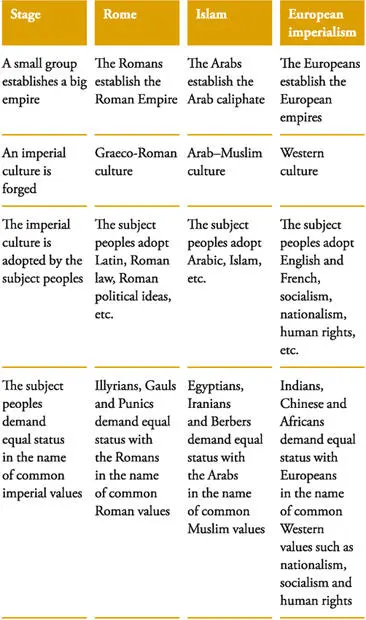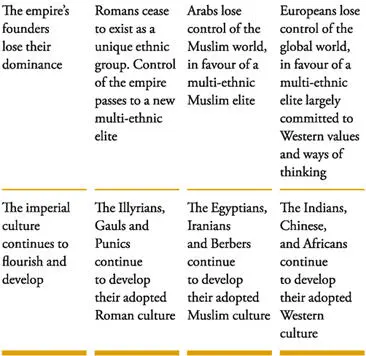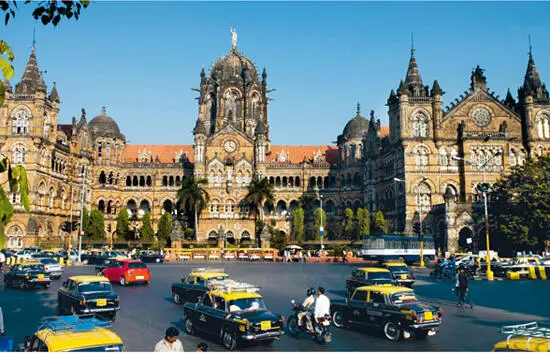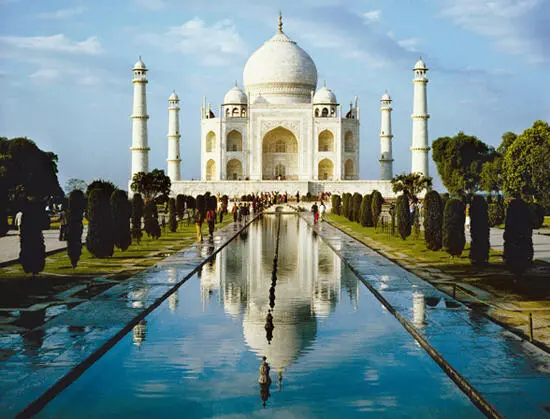The Imperial Cycle


During the twentieth century, local groups that had adopted Western values claimed equality with their European conquerors in the name of these very values. Many anti-colonial struggles were waged under the banners of self-determination, socialism and human rights, all of which are Western legacies. Just as Egyptians, Iranians and Turks adopted and adapted the imperial culture that they inherited from the original Arab conquerors, so today’s Indians, Africans and Chinese have accepted much of the imperial culture of their former Western overlords, while seeking to mould it in accordance with their needs and traditions.
Good Guys and Bad Guys in History
It is tempting to divide history neatly into good guys and bad guys, with all empires among the bad guys. For the vast majority of empires were founded on blood, and maintained their power through oppression and war. Yet most of today’s cultures are based on imperial legacies. If empires are by definition bad, what does that say about us?
There are schools of thought and political movements that seek to purge human culture of imperialism, leaving behind what they claim is a pure, authentic civilisation, untainted by sin. These ideologies are at best naïve; at worst they serve as disingenuous window-dressing for crude nationalism and bigotry. Perhaps you could make a case that some of the myriad cultures that emerged at the dawn of recorded history were pure, untouched by sin and unadulterated by other societies. But no culture since that dawn can reasonably make that claim, certainly no culture that exists now on earth. All human cultures are at least in part the legacy of empires and imperial civilisations, and no academic or political surgery can cut out the imperial legacies without killing the patient.
Think, for example, about the love-hate relationship between the independent Indian republic of today and the British Raj. The British conquest and occupation of India cost the lives of millions of Indians, and was responsible for the continuous humiliation and exploitation of hundreds of millions more. Yet many Indians adopted, with the zest of converts, Western ideas such as self-determination and human rights, and were dismayed when the British refused to live up to their own declared values by granting native Indians either equal rights as British subjects or independence.
Nevertheless, the modern Indian state is a child of the British Empire. The British killed, injured and persecuted the inhabitants of the subcontinent, but they also united a bewildering mosaic of warring kingdoms, principalities and tribes, creating a shared national consciousness and a country that functioned more or less as a single political unit. They laid the foundations of the Indian judicial system, created its administrative structure, and built the railroad network that was critical for economic integration. Independent India adopted Western democracy, in its British incarnation, as its form of government. English is still the subcontinent’s lingua franca, a neutral tongue that native speakers of Hindi, Tamil and Malayalam can use to communicate. Indians are passionate cricket players and chai (tea) drinkers, and both game and beverage are British legacies. Commercial tea farming did not exist in India until the mid-nineteenth century, when it was introduced by the British East India Company. It was the snobbish British sahibs who spread the custom of tea drinking throughout the subcontinent.

28. The Chhatrapati Shivaji train station in Mumbai. It began its life as Victoria Station, Bombay. The British built it in the Neo-Gothic style that was popular in late nineteenth-century Britain. A Hindu nationalist government changed the names of both city and station, but showed no appetite for razing such a magnificent building, even if it was built by foreign oppressors.
How many Indians today would want to call a vote to divest themselves of democracy, English, the railway network, the legal system, cricket and tea on the grounds that they are imperial legacies? And if they did, wouldn’t the very act of calling a vote to decide the issue demonstrate their debt to their former overlords?

29. The Taj Mahal. An example of ‘authentic’ Indian culture, or the alien creation of Muslim imperialism?
Even if we were to completely disavow the legacy of a brutal empire in the hope of reconstructing and safeguarding the ‘authentic’ cultures that preceded it, in all probability what we will be defending is nothing but the legacy of an older and no less brutal empire. Those who resent the mutilation of Indian culture by the British Raj inadvertently sanctify the legacies of the Mughal Empire and the conquering sultanate of Delhi. And whoever attempts to rescue ‘authentic Indian culture’ from the alien influences of these Muslim empires sanctifies the legacies of the Gupta Empire, the Kushan Empire and the Maurya Empire. If an extreme Hindu nationalist were to destroy all the buildings left by the British conquerors, such as Mumbai’s main train station, what about the structures left by India’s Muslim conquerors, such as the Taj Mahal?
Nobody really knows how to solve this thorny question of cultural inheritance. Whatever path we take, the first step is to acknowledge the complexity of the dilemma and to accept that simplistically dividing the past into good guys and bad guys leads nowhere. Unless, of course, we are willing to admit that we usually follow the lead of the bad guys.
The New Global Empire
Since around 200 BC, most humans have lived in empires. It seems likely that in the future, too, most humans will live in one. But this time the empire will be truly global. The imperial vision of dominion over the entire world could be imminent.
As the twenty-first century unfolds, nationalism is fast losing ground. More and more people believe that all of humankind is the legitimate source of political authority, rather than the members of a particular nationality, and that safeguarding human rights and protecting the interests of the entire human species should be the guiding light of politics. If so, having close to 200 independent states is a hindrance rather than a help. Since Swedes, Indonesians and Nigerians deserve the same human rights, wouldn’t it be simpler for a single global government to safeguard them?
The appearance of essentially global problems, such as melting ice caps, nibbles away at whatever legitimacy remains to the independent nation states. No sovereign state will be able to overcome global warming on its own. The Chinese Mandate of Heaven was given by Heaven to solve the problems of humankind. The modern Mandate of Heaven will be given by humankind to solve the problems of heaven, such as the hole in the ozone layer and the accumulation of greenhouse gases. The colour of the global empire may well be green.
As of 2014, the world is still politically fragmented, but states are fast losing their independence. Not one of them is really able to execute independent economic policies, to declare and wage wars as it pleases, or even to run its own internal affairs as it sees fit. States are increasingly open to the machinations of global markets, to the interference of global companies and NGOs, and to the supervision of global public opinion and the international judicial system. States are obliged to conform to global standards of financial behaviour, environmental policy and justice. Immensely powerful currents of capital, labour and information turn and shape the world, with a growing disregard for the borders and opinions of states.
Читать дальше







![Юваль Ной Харари - Sapiens. Краткая история человечества [litres]](/books/34310/yuval-noj-harari-sapiens-kratkaya-istoriya-cheloveche-thumb.webp)





![Юваль Ной Харари - 21 урок для XXI века [Версия с комментированными отличиями перевода]](/books/412481/yuval-noj-harari-21-urok-dlya-xxi-veka-versiya-s-ko-thumb.webp)


